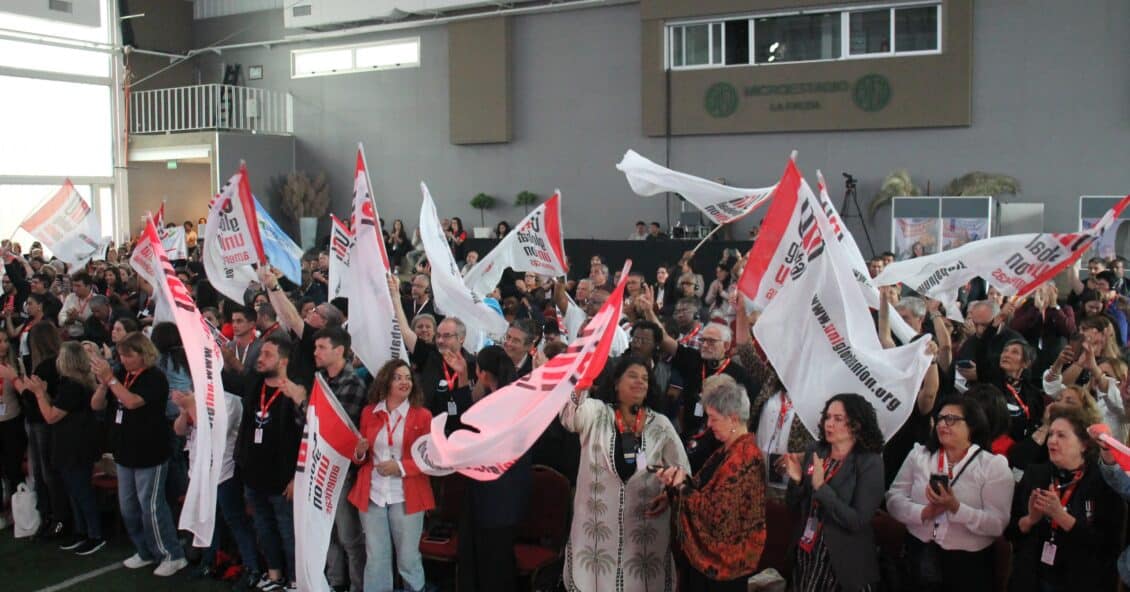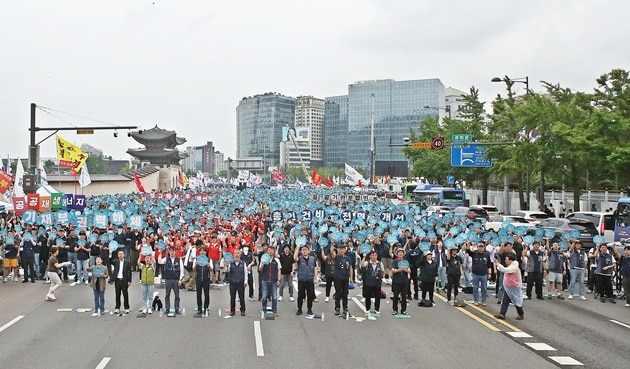UNI Americas Regional Conference: solidarity in action for workers’ rights, democracy, and sustainability
07.12.24
Amidst mounting challenges for workers across the Americas, trade unionists from 17 countries concluded the 6th UNI Americas Regional Conference in La Falda, Argentina, with renewed unity, energy, and determination to drive transformational change over the next four years. Nearly 600 union leaders and members gathered from December 5–7 to address critical issues such as defending democratic rights, advancing collective bargaining, promoting equality, and reinforcing the labour movement’s commitment to combating climate change.
“These words—hope and action—have represented the sheer essence of international work. We come together to give ourselves collective hope to take more action,” said Christy Hoffman, General Secretary of UNI Global Union, as she welcomed the crowd. “Here in Argentina, Milei came to power with the intention of weakening unions. To your credit, Argentinean unions came together to send a message: ‘You will not take down our house.’ Milei and his cronies completely underestimated your power. Your actions have made it difficult for Milei to pursue his agenda.”
The conference adopted nine key motions that will guide UNI Americas’ strategies from 2025 to 2028. Central to these is Breaking Barriers: Strategic Plan 2025–2028, which prioritizes strengthening union presence in traditionally low-density sectors such as technology and care services. This motion promotes the use of digital tools for organizing and training, ensuring unions adapt to the changing nature of work.
Marcio Monzane, Regional Secretary of UNI Americas, opened the conference with a clear call to action: “UNI Americas must be the organization that proposes solutions, we want to grow in organization and have an active force in society. We want to transform our societies, we want to be the voice of our affiliates, we want to be always present. We have a constant struggle against privatizations, we have work to do against violence and harassment in the workplace, that’s why we are part of the biggest push in the region for the ratification of ILO Convention 190.”
The Solidarity for Democracy and Social Justice motion addresses growing threats to democracy in the region, emphasizing the importance of defending democratic processes, advancing gender equality, and advocating for the ratification of ILO Convention 190 to eliminate workplace violence.
As industries face disruption from automation and artificial intelligence, the Economic and Technological Transformations motion underscores the importance of ensuring equitable integration of these technologies through enhanced collective bargaining and regional research initiatives.
Panels during the conference highlighted successful unionization and collective bargaining campaigns. Heron Alves shared how over 635 Amazon workers in Brazil were unionized through grassroots outreach, while Henry Mena in Peru spearheaded the creation of the country’s first casino workers’ union. Catalina Beltrán in Colombia leveraged social media to engage workers and clients in negotiations, reflecting innovative approaches to organizing against precarious labour.
Political leaders lent their voices to the causes with Andrés Giordano, Deputy from Chile, remarking, “The role of organized workers is irreplaceable. We must press harder on projects that affect inequality, such as pension reforms and collective bargaining.” Colombian Senator Wilson Arias added, “We must move away from traditional debt structures and address corruption to ensure economic justice for all.”
Héctor Daer, President of UNI Americas, captured the spirit of the event: “Solidarity and cooperation among unions make us stronger. We must strive for a sustainable world that reduces inequality, and we must do so together.”
The adopted motions reflect UNI Americas’ commitment to empowering workers, safeguarding democracy, and addressing global challenges. “These motions are about recognizing the inherent value in every worker and every individual,” said Gerard Dwyer, President of UNI Global Union. “Progress should lift everyone, not just the privileged few.”
The conference closed with the re-election of Marcio Monzane as General Secretary of UNI Americas. Addressing the delegates, Monzane expressed gratitude to his colleagues, family, and the broader UNI Americas community for their unwavering support. “To resist, for us, is not just to react but to act with purpose. We live in a scenario where the historical achievements of the labour movement are being questioned or dismantled. But history shows us that organized resistance has power. To resist is to remember that our rights are not concessions—they are achievements gained through tremendous effort and struggle.”
As the gathering concluded, its message was clear: building stronger unions strengthens democracy and paves the way for a more equitable and sustainable future.
News
News
UNI Americas


